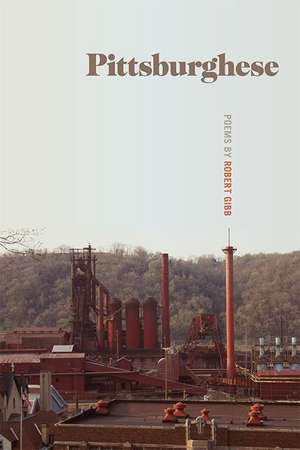Pittsburghese: Wheelbarrow Books
Autor Robert Gibben Limba Engleză Paperback – 2024
Preț: 80.21 lei
Nou
Puncte Express: 120
Preț estimativ în valută:
15.35€ • 16.68$ • 12.90£
15.35€ • 16.68$ • 12.90£
Carte indisponibilă temporar
Doresc să fiu notificat când acest titlu va fi disponibil:
Se trimite...
Preluare comenzi: 021 569.72.76
Specificații
ISBN-13: 9781611864878
ISBN-10: 1611864879
Pagini: 100
Dimensiuni: 152 x 229 x 10 mm
Greutate: 0.1 kg
Editura: Michigan State University Press
Colecția Wheelbarrow Books
Seria Wheelbarrow Books
ISBN-10: 1611864879
Pagini: 100
Dimensiuni: 152 x 229 x 10 mm
Greutate: 0.1 kg
Editura: Michigan State University Press
Colecția Wheelbarrow Books
Seria Wheelbarrow Books
Recenzii
Pittsburghese is the language spoken in the pages of this poet’s singular concoction, a mix of keen musicality and uncommon sagacity that wound itself purposely and sinuously through my imagination like the twisty hills and bridges of its hometown. In the tradition of learning the sacred, secret loves of a burnished and bellowed metropolis, this poet’s voice masterfully testifies to neighborhoods and lives doused in enough heat to melt but then forged in enough wry and heart-busted love to craft the wiry steel of these poems. —Tyehimba Jess, author of Olio, winner of the Pulitzer Prize in Poetry
Robert Gibb’s Pittsburghese is an impressive homage to the “iron” city of Pittsburgh, its culture, its people, its industrial past of steel production, its subsequent economic decline, and its hard-won resurgence. Meditations, elegies, and ekphrastic pieces abound in which the poet renders in potent lyricism the “mills’ brutal music,” a muscular counterpoint to William Wordsworth’s “the still, sad music of humanity” from “Tintern Abbey.” Like Wordsworth, Gibb is a consummate poet of personal memory, specifically of his childhood and youth in nearby Homestead with its “crowded rows of houses [and] Steel mills billowing / Identical plumes of smoke.” His language is elegant and precise, rich with inventive images, such as the “auroras of white-hot scoria” of the blast furnaces. Gibb is the bard par excellence of Pittsburgh. —Orlando Ricardo Menes, author of The Gospel of Wildflowers and Weeds
Gibb’s poems are so natural in their tone that they might seem like someone, anyone, just talking; that is, if anyone but Gibb could have a genius for lyric precision, a painter’s eye for detail, an impeccable ear for the music of his native dialect, and an unbearable grief born from the awareness of losing everything that matters to him a little at a time. —Michael Simms, Plume Poetry
Robert Gibb’s Pittsburghese is an impressive homage to the “iron” city of Pittsburgh, its culture, its people, its industrial past of steel production, its subsequent economic decline, and its hard-won resurgence. Meditations, elegies, and ekphrastic pieces abound in which the poet renders in potent lyricism the “mills’ brutal music,” a muscular counterpoint to William Wordsworth’s “the still, sad music of humanity” from “Tintern Abbey.” Like Wordsworth, Gibb is a consummate poet of personal memory, specifically of his childhood and youth in nearby Homestead with its “crowded rows of houses [and] Steel mills billowing / Identical plumes of smoke.” His language is elegant and precise, rich with inventive images, such as the “auroras of white-hot scoria” of the blast furnaces. Gibb is the bard par excellence of Pittsburgh. —Orlando Ricardo Menes, author of The Gospel of Wildflowers and Weeds
Gibb’s poems are so natural in their tone that they might seem like someone, anyone, just talking; that is, if anyone but Gibb could have a genius for lyric precision, a painter’s eye for detail, an impeccable ear for the music of his native dialect, and an unbearable grief born from the awareness of losing everything that matters to him a little at a time. —Michael Simms, Plume Poetry
Notă biografică
Robert Gibb is the author of Sightlines, his thirteenth full-length poetry collection and winner of the 2019 Prize Americana for Poetry. Other books include Among Ruins, which won Notre Dame’s Sandeen Prize in Poetry for 2017; After, which won the Marsh Hawk Press Poetry Prize for 2016; and The Origins of Evening, which was a National Poetry Series selection. He has been awarded two NEA Fellowships, a Best American Poetry Prize, a Pushcart Prize, and Prairie Schooner’s Glenna Luschei and Strousse Awards.
Descriere
Pittsburghese, the latest offering from American poet Robert Gibb, is a work of poignant remembrance, filled with the revelations found in the everyday “debris of paradise.” It encompasses both a world of elegies for the great buildings and working stiffs of the city’s industrial past, and a pantheist sensibility alert to the “necessary mystery” of the trees and the city’s wild creatures.









